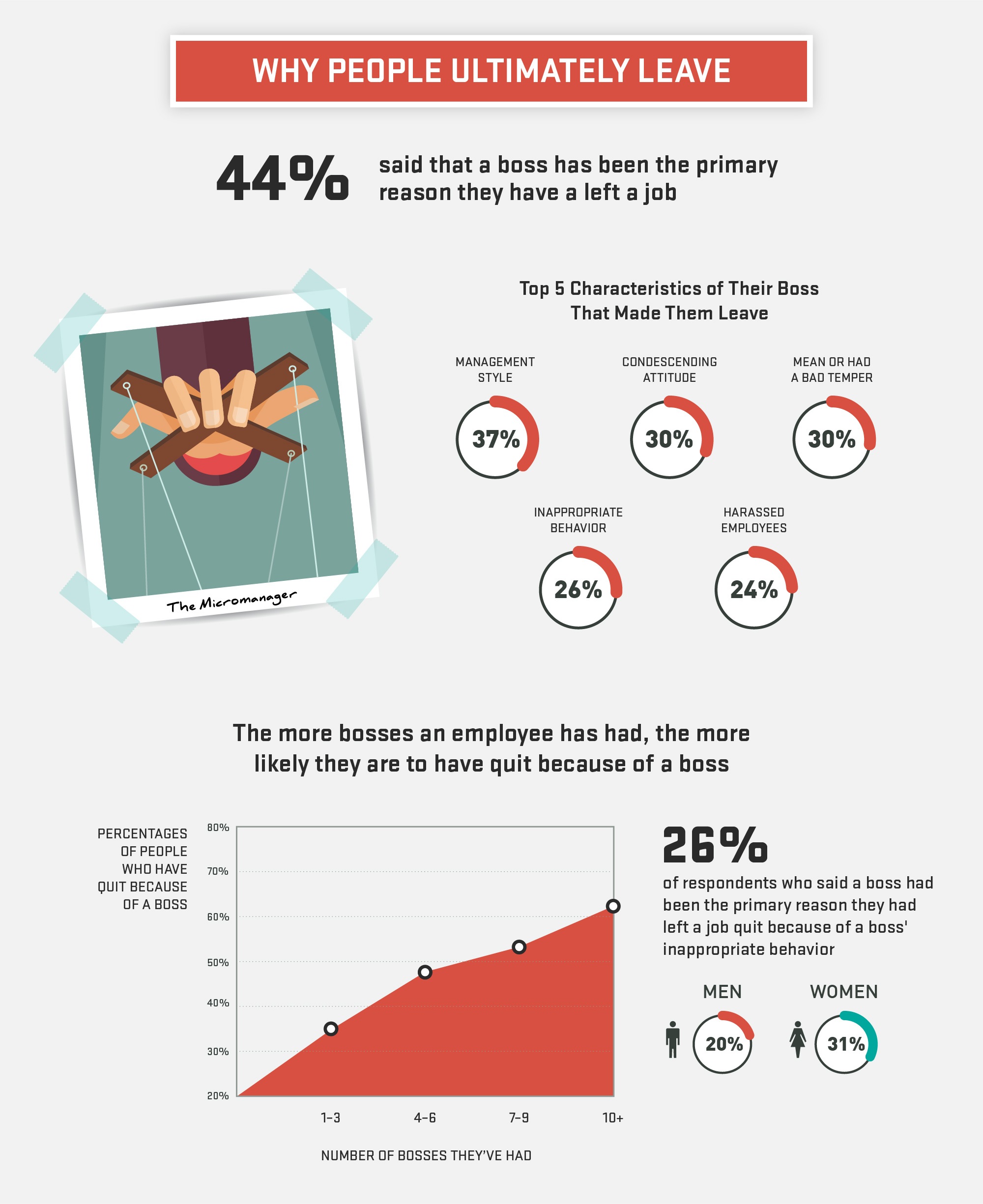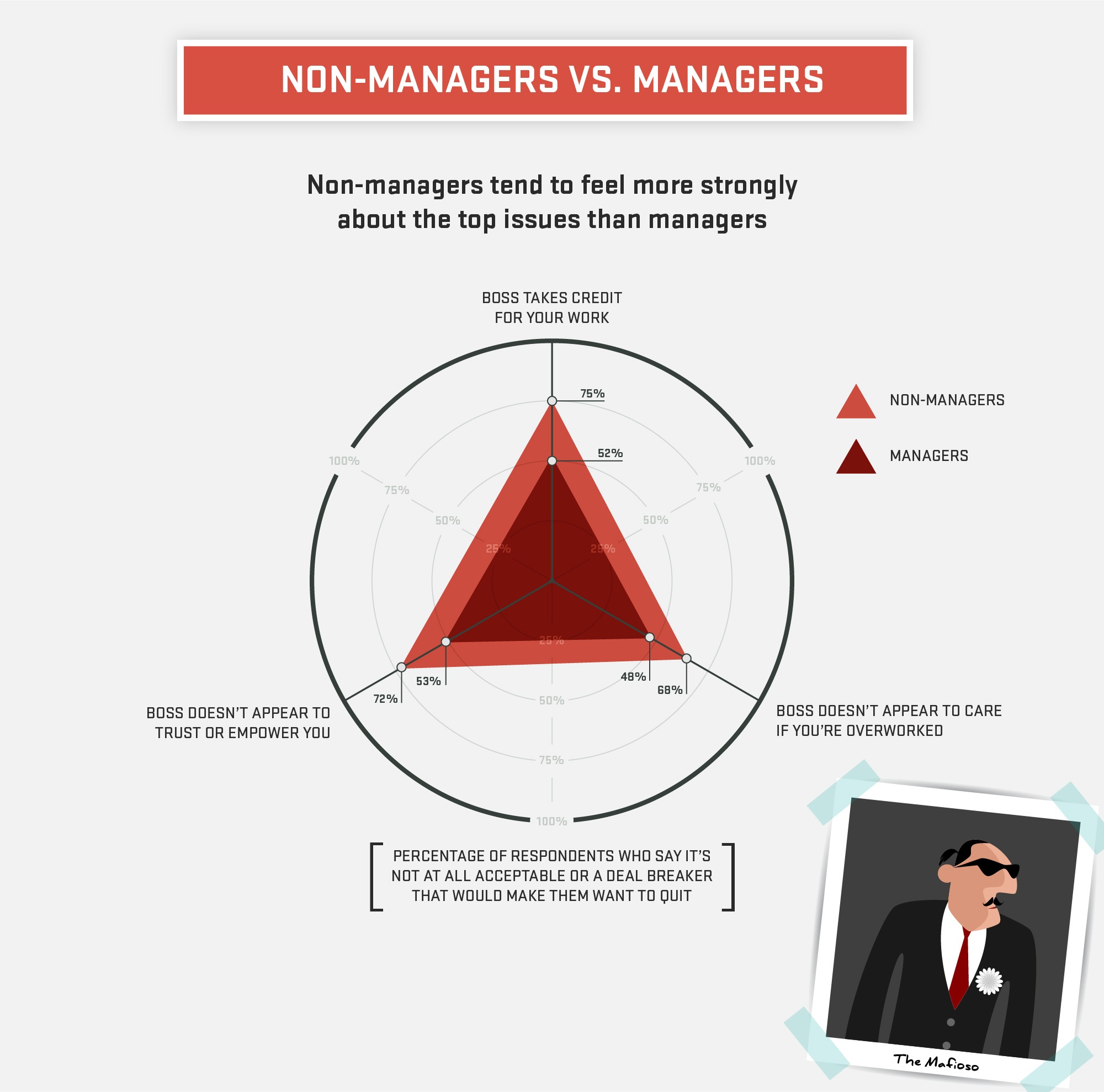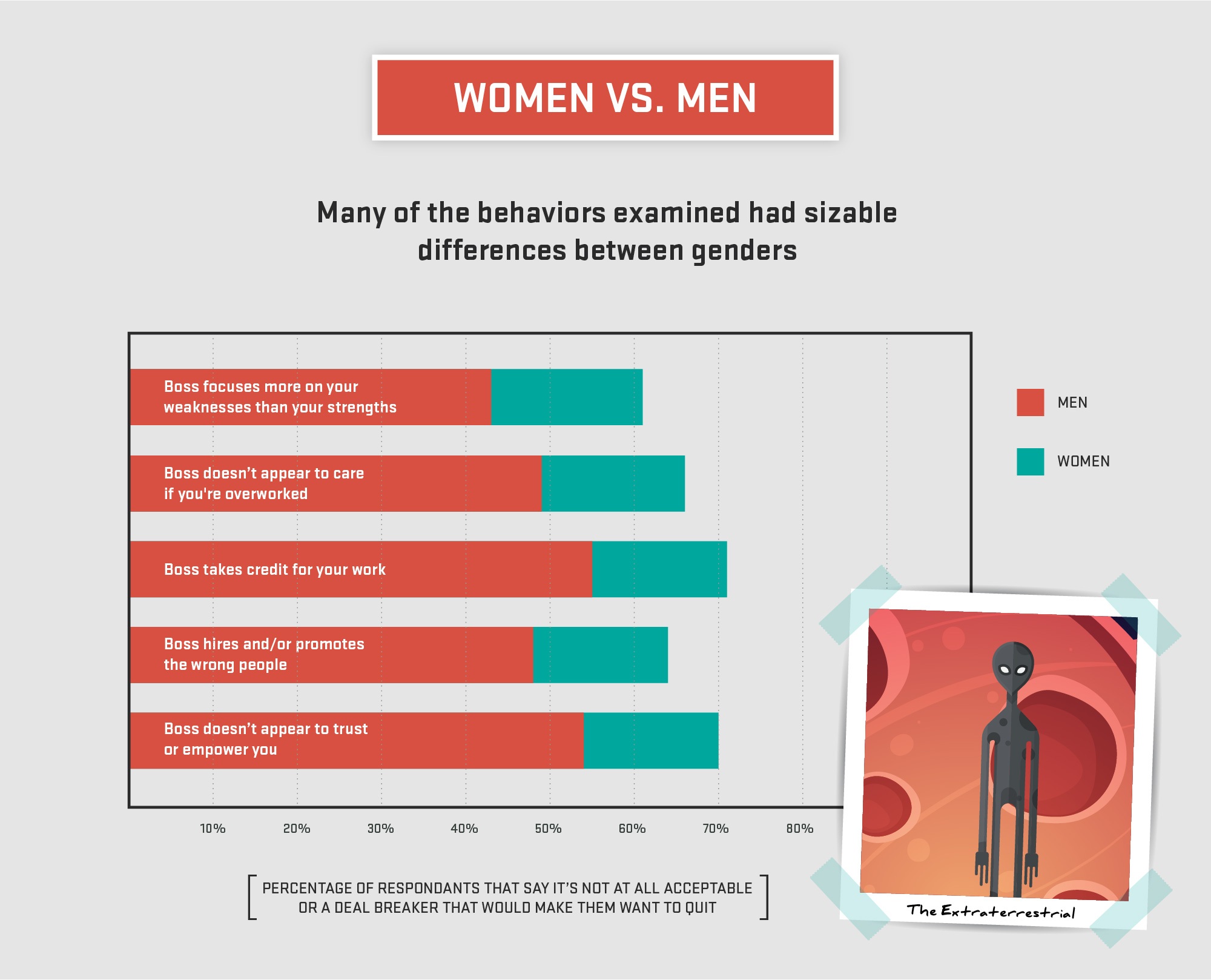Bad Boss Index: 1,000 Employees Name Worst Manager Behaviors [Infographic]
What does poor management mean? Whether it’s the credit taker, the harasser, the micro-manager, or the CEO’s incompetent kid, we’ve all seen bad manager behavior and felt the negative consequences of their poor management.
Whether you’ve been a victim or the culprit of bad boss behavior, you’ve probably seen how poor management can seriously impact critical business outcomes like employee performance and retention. In short, bad bosses cannot go unchecked.
Bad Boss Findings
To help organizations identify toxic behaviors and improve employees’ experiences with their bosses, we created a list of 24 potentially bad boss behaviors and asked more than 1,000 US-based employees in various roles to rate them from “totally acceptable” to “totally unacceptable.” Here are some of the most significant findings from the survey.
1) Taking Credit for Employees’ Work Is the Worst
Chances are, it’s happened to you. You contribute a fantastic idea, invest your heart and soul into a project, or make a big process change that saves the organization a ton of money, only to have your boss smile and accept all the praise from higher-ups without so much as a nod in your direction.
It’s more than just infuriating; not receiving recognition for your work can directly impact your career. It’s no wonder that this bad manager behavior tops the list as most aggravating for employees.
While younger employees might tolerate some credit thievery from a bad manager, the older employees get, the less they are willing to put up with it. Of employees aged 18–29, 57 percent say that bosses taking credit for their work is unacceptable. This number rises steadily as employees age, topping out at 77 percent of employees aged 60+.

2) Managers Say It’s Not so Bad
On the other side of the equation, the bosses we surveyed don’t think their employees’ most-hated behaviors are really all that bad.
When it comes to taking credit for employees’ work, not trusting or empowering employees, and overworking employees, the number of managers who feel these behaviors are unacceptable is 20 percent lower than the number of employees who feel that way.
Whether this difference is because of bias or merely varying perspectives is unclear, but it’s clear there is some disconnect when it comes to leaders judging what may irk their people.

3) Women and Men Rate Bad Behavior Differently
Out of 24 boss behaviors, women found 19 of them more unacceptable than their male counterparts did. Meanwhile, men felt more strongly than women about only five negative behaviors, many of which deal with a lack of acceptance by their manager. The five behaviors that men rated as more unacceptable when compared to women’s responses were:
- Refuses to friend you on social media
- Doesn’t like to spend time together outside of work
- Pushes you outside your comfort zone with new tasks and assignments
- Requires you to take personal days for mental wellbeing
- Doesn’t publicly recognize your contributions in front of upper management
While we found it compelling that virtually identical numbers of men and women have left a job due to bad management behavior, we weren’t surprised to see that the type of behavior that caused their departure was markedly different.
While 44 percent of both female and male respondents indicated that they have quit a job because of a bad boss, 31 percent of the women said they left due to “inappropriate” behavior, while only 20 percent of the men said the same. No doubt this stems from the disparity between the amount of male and female sexual harassment victims.

To learn more about the differences between the experiences of men and women, as discovered in the Bad Boss Index, go here.
What Do You Do When You Have a Bad Manager?
While we hope you never have to work with a bad boss, chances are that you’ll find yourself under a lousy manager at some point. So what do you do when that happens? Before you start planning your exit strategy, first see if there are ways to remedy the situation.
The Unwitting Bad Boss
It’s possible your boss doesn’t realize they are a bad boss. Remember, the definition of bad is subjective. The manager who fails to provide direction and is hands-off may think the behavior empowers employees. Your manager might be untrained, overwhelmed, or simply have different values than you.
If you have an unwitting bad boss, then the first step is to have a conversation. Explain the type of support you are looking for in a direct and polite way that focuses on your needs. If you’ve tried communicating directly and it doesn’t work, then it might be time to go to your boss’s supervisor or HR—but make sure you’ve tried to work it out with your boss first.
A Bad Boss Who Is Aware
Those managers who know they behave in ways that employees don’t like require a different approach than the unwitting bad boss. These bosses may feel that their bad manager behavior is encouraged or condoned by the workplace culture. They may have learned this management style from a previous boss who was considered successful.
Try talking to your boss about how their words or actions affect your performance. Consider making requests for what you need (resources, support, etc.), rather than giving feedback on what your boss is doing wrong. Do this privately—you don’t want to start a public war.
If the behavior doesn’t change, then go to your boss’s supervisor or the human resources department. Explain the impact that your boss’s specific behavior has on you and your performance, and then let them take it from there. After giving sufficient time for any actions by HR to take effect, if there is no change, then you may want to request a transfer to a different office or department.
And if that fails, it may be time to find another job.
It’s important to note that you do not have to stay in a job where you feel demeaned or unsafe. There are situations where the best option is to leave, and you need to trust yourself when that is the case.
How to Complain About a Manager (Without Getting Fired)
If you’ve tried talking directly to your boss and that hasn’t worked, the next step is often to go to HR or your manager’s boss. Try not to approach this as just an opportunity to complain about your boss. Instead, make the conversation constructive and productive as possible with these tips:
- Focus on the impact your boss’s behavior has on you, your productivity, and your team. It’s not time to simply point fingers.
- Be specific. Give concrete examples and explanations for how the behavior is negatively affecting the workplace.
- Share the steps you have already taken on your own to rectify the situation.
- Be ready to listen and take further action on your own. HR may give you new ideas and suggestions for what else to try.
How to Improve Management Skills
If you find you are guilty of some of these bad behaviors, or you realize some of your organization’s managers may be, it’s time to act. Ignoring bad behavior could lead to some serious consequences, including unsatisfied employees, high turnover, and possibly even legal issues.
There are currently more job openings than there are people looking for work, and surely you cannot afford to let poor management put you in a hiring bind. So, before we’re accused of being Debbie Downers, let’s discuss a couple of solutions to the bad boss dilemma.
Foster a Culture of Feedback
Smart organizations take performance management seriously, and this means doing performance reviews the right way. The best way to accurately gauge and improve performance is by offering 360-degree feedback on an ongoing basis.
If your organization doesn’t give its people a way to honestly (i.e., anonymously) offer feedback on their leaders, it’ll be very difficult to spot out poor management practices before they become a bigger issue. Even more, if your feedback cycles are annual, it’ll take you a lot longer to address these bad boss behaviors. Frequency is crucial when fostering a culture of feedback.
Act on Feedback
All the feedback in the world is meaningless if you don’t act on it.
After you’ve identified toxic behavior in your organization, you have one of two choices: work with those individuals to improve their management skills or terminate them. The reality is that the Bad Boss Index is littered with bad manager behaviors that are easily fixed, so unless you find somebody is committing fireable offenses, we suggest taking the former approach.
The first step is to help leaders identify their management style so that they can better understand their strengths and weaknesses. From there, it’s about managing your managers through continued feedback and effective coaching.
Conclusion
We hope leaders will take a look around their organizations to identify possible bad boss behaviors and characteristics so that they can make improvements as soon as possible. Employees deserve to be treated with respect, cared for, and led by bosses who treat them fairly; likewise, managers deserve to know what they’re doing wrong so that they can learn and improve.
Curious? Download The Full Bad Boss Index Here
Get caught up every month on all things HR. Don't worry, we promise we won't spam you.









